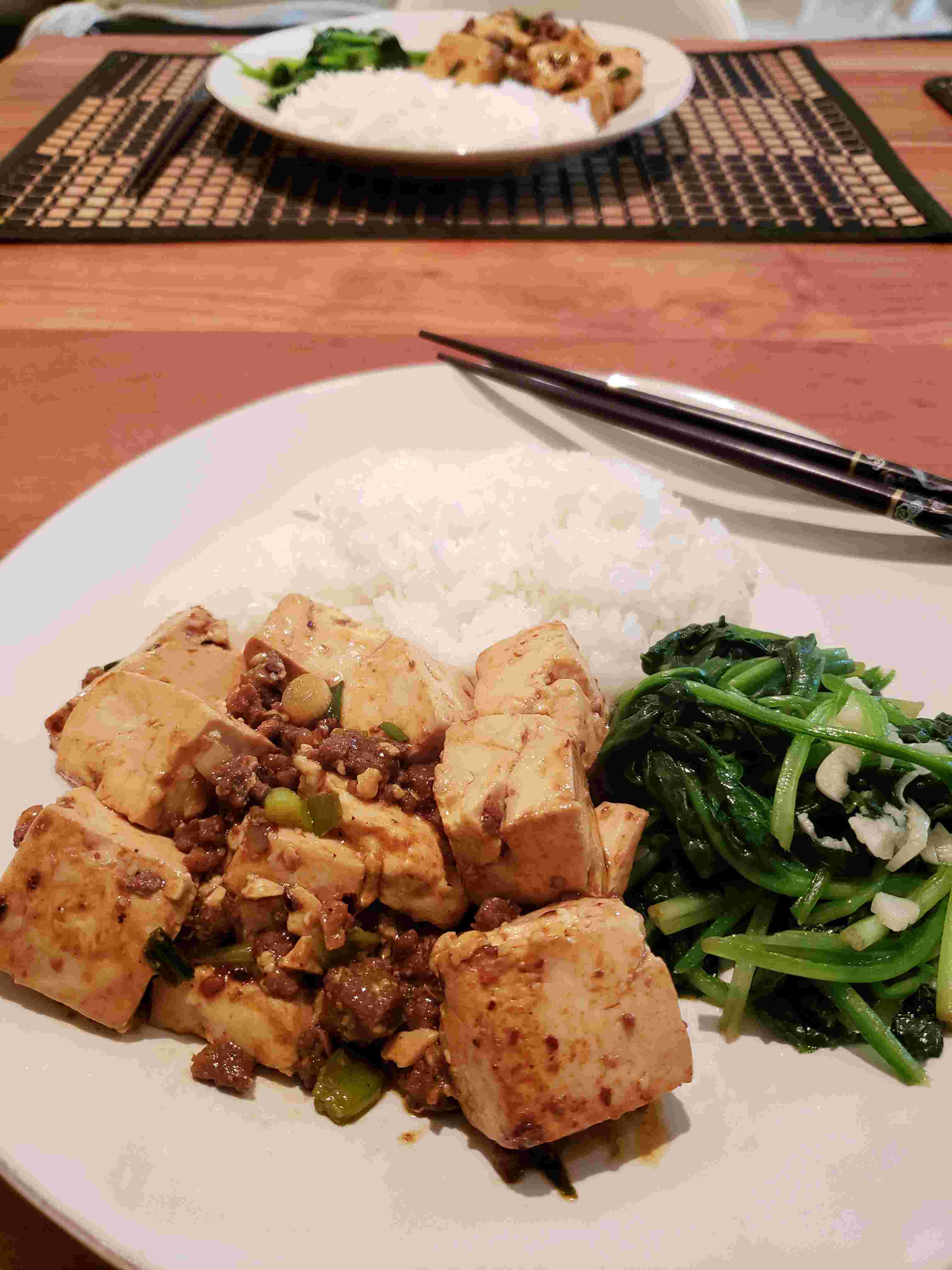
Introducing for your spicy, numbing food pleasure, Szechuan peppercorns!

I love spicy food, and I love Szechuan food in particular. Chili fish, chili green beans, spicy chili peanut noodles all get my mouth watering! Besides chili, an incredibly underrated staple spice that gives Szechuan food its distinctive, tongue-tingling, numbing flavor is the almighty Szechuan (also spelled Sichuan) peppercorn. Despite its name, the Szechuan peppercorn is not actually related to either black pepper or chili pepper at all. Instead, it is the pinkish-red dried outer husks of berries found on the prickly ash shrub, a squat shrub or small tree in the citrus family. Thus, the peppercorns have been described to have slight lemony overtones, although I’ve never noticed this. (Full disclosure – I’ve been eating these things all my life, and only now did I learn from Wikipedia that the Szechuan peppercorn is not a peppercorn. Mind. Blown. This blog teaches me so many things.)
You can find these peppercorns at any Asian supermarket or specialty spice store. They’re getting more popular, and I now see them in the spice aisle of large American supermarkets. Amazon also sells them, but I’ve never bought spices off Amazon, so I can’t vouch for their freshness. I’ve only seen them sold as whole peppercorns, although I’ve heard they can also be sold as a more finely ground powder – similar to ground black pepper. I buy them whole and crush them to coarse pieces in a mortar and pestle before using. James absolutely adores these peppercorns and will just throw them randomly on anything he cooks, from steaks to chow fun to roasted vegetables, so they can be very versatile!
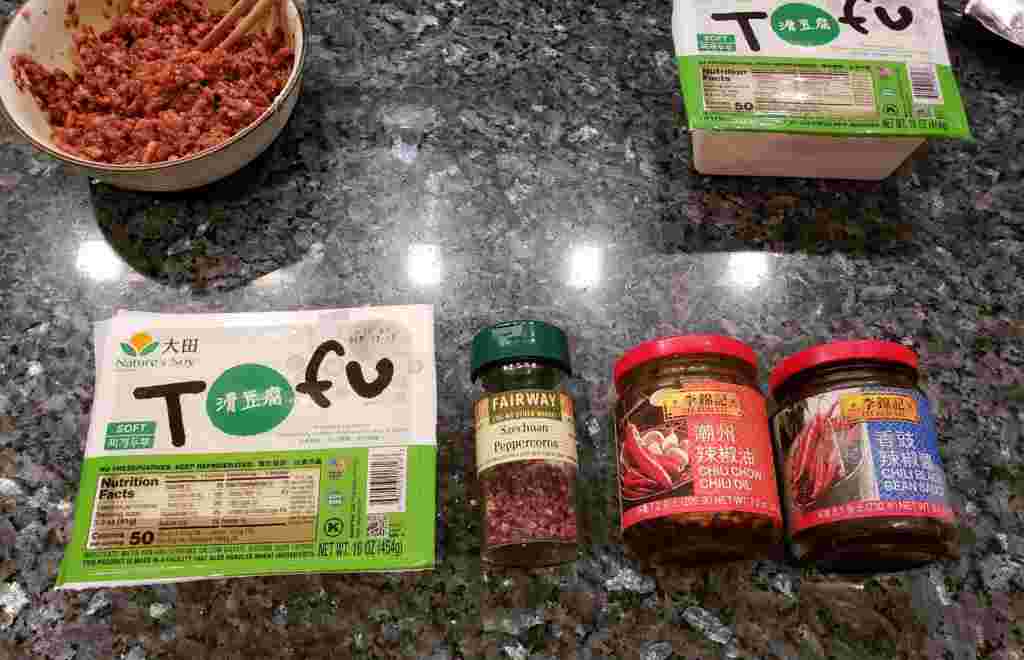
Anyway, a very popular and common Szechuan dish is MaPo tofu, a stir-fry of cubes of soft tofu with ground pork, chili, and scallions, all laced with fragrant, numbing Szechuan peppercorns. The flavor and sensation that Szechuan peppercorns impart in your mouth is described in Chinese as “mala,” literally translating to “numbing spice,” or “numbing heat.” You’ll see the term “mala” a lot at Szechuan restaurants, as much of the food is served with a fiery red mala sauce composed of Szechuan peppercorns, chili peppers, garlic, ginger, star anise, and other spices.
MaPo tofu is super easy to make, and is meant to be ladled on top of a mound of steaming hot rice, soaking up all the juices, that will have you slurping up every silky bite. Disclaimer: my version is probably not that “authentic,” although for a dish as simple and omnipresent as MaPo tofu, it’s hard to specify what authentic really means. My version contains my shortcuts and my memories. I also cheat by buying these lovely sauces from Lee Kum Kee – they are a Hong Kong-based food company whose sauces have fully permeated the American market. The black bean sauce adds a flavorful, salty punch to the tofu, and if you like the tofu spicier, you can add chili oil as well (I suspect that to be more authentic, the chili oil should actually be mandatory, not optional, and I should probably make it from scratch with dried red chilis, but… this is the beauty of Chinese food – the continent and the diaspora is so vast, that the food easily morphs and adapts as the country’s immigrants move to new places, get commutes, and have to get dinner on the table in 30 minutes. Shrug!). The dish should be made with soft tofu, although you can use silken tofu as well – it will just crumble a bit more. For Szechuan peppercorn novices, I suggest you start with about 1 teaspoon and see how you like the flavor; you can always add more at the very end. For Szechuan peppercorn aficionados, I go all the way up to about 1 1/2 tablespoons of peppercorns. Try to crush them if you can, or find the preground powder. In laziness, I’ve definitely tossed Szechuan peppercorns into dishes whole before. It’s alright – whole, they don’t really impart their flavor to the rest of the dish, and you’ll just get little zingers of VERY INTENSE NUMBING PEPPERCORNNESS when you luck into a bite containing a peppercorn. Like I said, just alright.
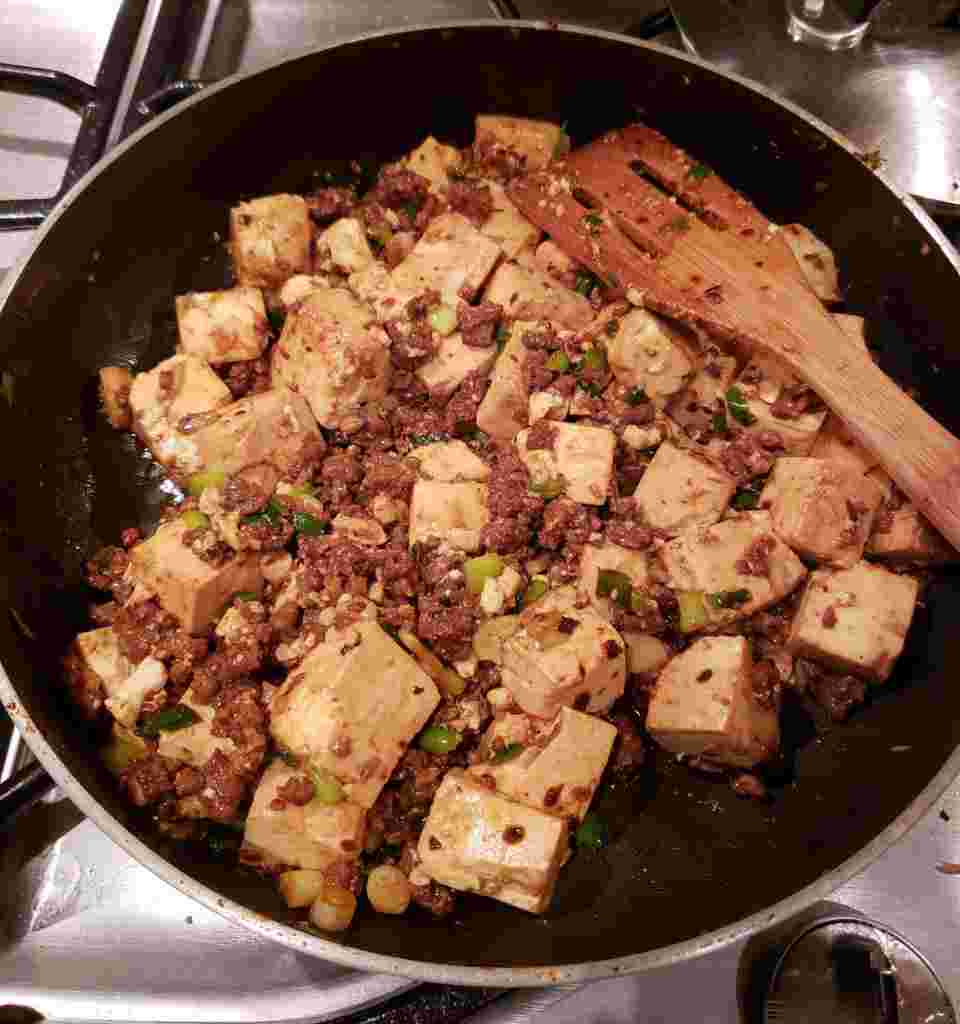
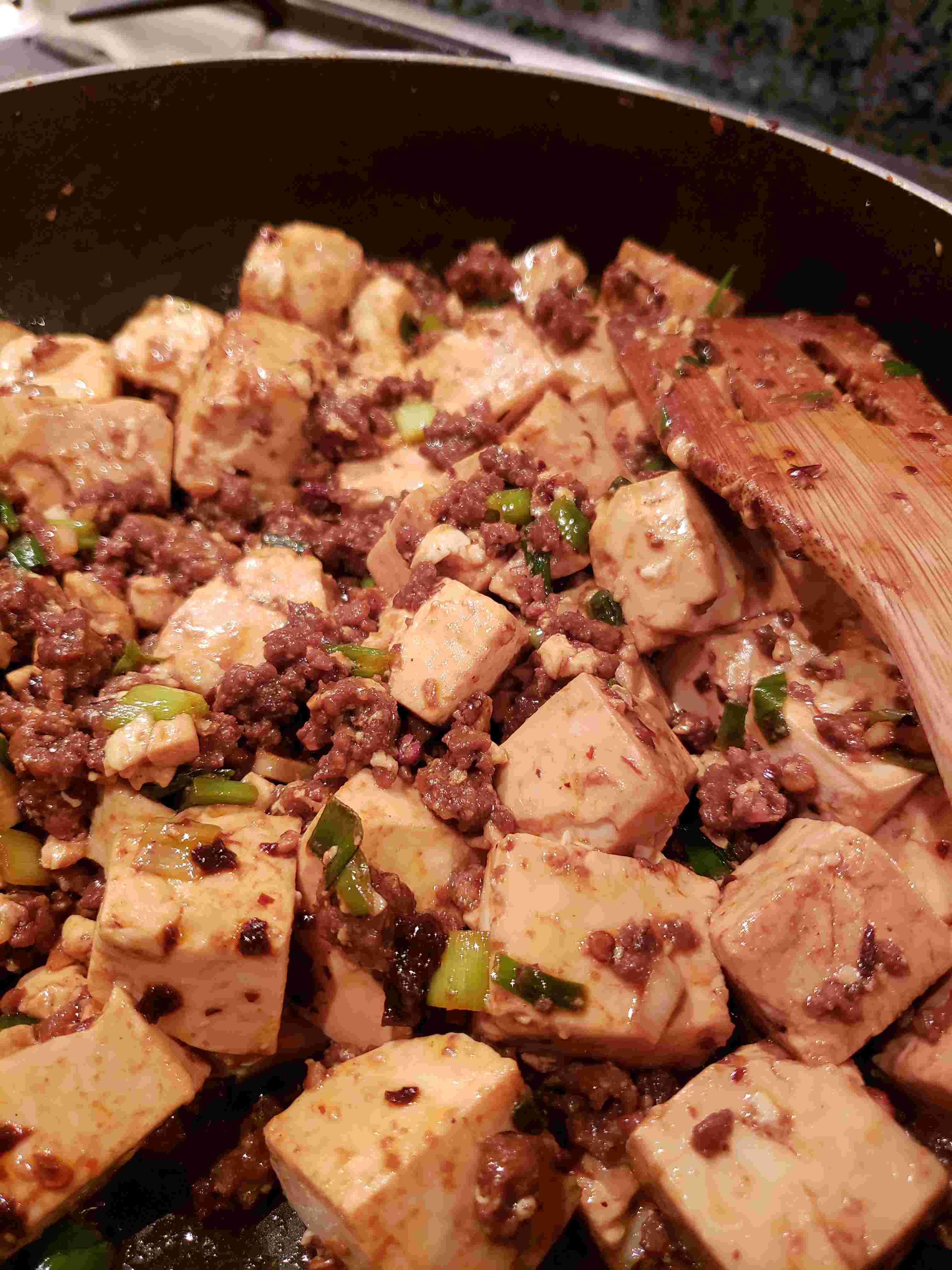
We served this with some sautéed spinach and white rice. Total time to dinner, including sides: about 45 minutes (rice takes about an hour to cook in the rice cooker, but that’s not really active time).
| Servings | Fuss Factor | Total Time | Prep Time | Cook Time |
|---|---|---|---|---|
| 4 | 1 | 25 minutes | 15 minutes | 10 minutes |
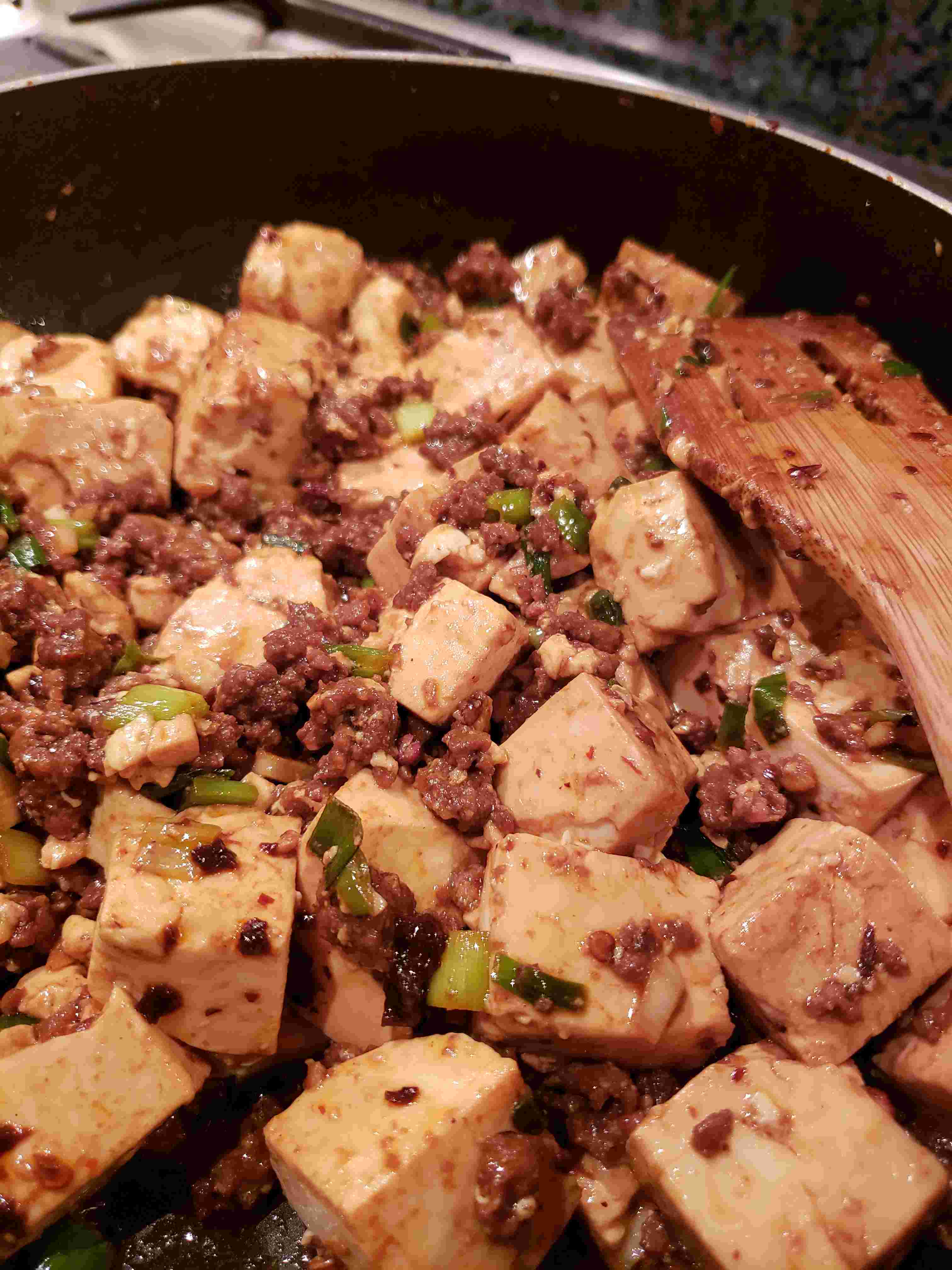
MaPo Tofu
Ingredients
Marinade:
- 1 tablespoon regular soy sauce
- 1 tablespoon dark soy sauce (can substitute regular)
- 1 tablespoon sesame oil
- 1 tablespoon corn starch
- 1 teaspoon Szechuan peppercorns, crushed, or more to taste (start with 1/4 - 1/2 teaspoon if your Szechuan peppercorns are preground into a very fine powder)
For the rest of the dish:
- 1/2 pound ground pork
- 2 packages soft tofu (16 ounces each)
- 4 cloves garlic, minced
- 1 tablespoon minced ginger
- 1 bunch scallions, roughly chopped
- 1 tablespoon regular soy sauce, or more to taste
- 1-2 tablespoons chili black bean sauce
- Optional: chili oil
Instructions
-
Combine the pork with all of the marinade ingredients, and let sit for at least 15 minutes. Drain the soft tofu, and cut into large squares, about 1 - 1.5 inches across.
-
Heat 1 tablespoon of canola oil in a large skillet over medium-high heat. When the oil is hot, add the garlic and ginger and about half the scallions and cook until fragrant, about 30 seconds. Add the pork with all of the marinade sauce and cook, stirring, until the pork is cooked through and no trace of pink remains, about 5 minutes. Scoop pork with a slotted spoon into a separate bowl and set aside, leaving behind the sauce and juices in the pan.
-
Add the tofu cubes into the skillet, along with the rest of the scallions and the regular soy sauce. Add the chili black bean sauce and the chili oil, if using. Cook until the tofu is slightly crumbling at the edges, about 3 minutes. Tofu is perfectly fine to eat right out of the package, so you're just heating it up here.
-
Add the pork back into the pot and stir to combine. Taste and add more sauce, chili oil, or Szechuan peppercorns, if desired.




